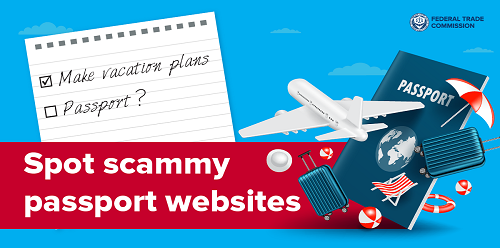Do you need to apply for or renew your passport? If you search online, the top results might show official-looking websites that say they can renew or get you a passport. Some of these websites are private companies that charge you for services that are free on the U.S. Department of State website…while others are scammers trying to take your money and personal information.
Travel.state.gov/content/travel is the official government website for passport services. Some companies registered with the U.S. Department of State charge extra fees to submit your application and pick up your passport if you’re busy or need help; however, you won’t get your passport faster than if you applied on your own without the extra cost. Review a list of companies registered with the U.S. Department of State.
Scammers also set up websites with similar names, flags, and seals, pretending to be a company affiliated with the government. For $60 to a few hundred dollars (on top of the regular passport fee), they promise to help you get a passport, but if you pay, you’ll lose your money and might be giving your personal information to scammers who could sell it to identity thieves.
To avoid passport scams, know this:
Contact PassportVisaFraud@state.gov if you spot a suspicious passport application, website, or if you paid someone who turned out to be a scammer. Visit IdentityTheft.gov if someone has misused your personal information.
Source: consumer.ftc.gov
